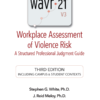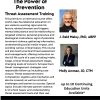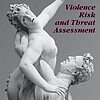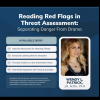Climate Program
By the year 2100, the term global warming will have been in use by the scientific community for more than a century. The alarm about climate change will have been sounding for over 100 years.
No one knows what the world will look like by then. Not politicians. Not pundits. Not even climate scientists.
What we do know is the affects of rising temperatures on a range of environmental changes from floods to droughts, wildfires, and sea level rise.
And we know that rising temperatures increase risk for interpersonal aggression and violence.
Migration and competition for scarce resources can lead to intergroup hostility, aggression, violence in the form of political conflict and war, extremism, and terrorism.
Through this two-hour Climate-Informed Behavioral Threat Assessment & Management workshop, you will be provided with actionable information that will allow you to incorporate climate change in evidence-based threat assessment and management protocols to support a more comprehensive approach to addressing contemporary risks.
Participants will be supported to:
- Define climate literacy.
- Describe the effects of climate change on the planet.
- Identify three techniques that reduce risk of malpractice.
- Describe the effects of climate change on human health.
- List the effects of climate change on aggression and violence.
- Incorporate climate threat assessment and management in threat assessment practices.
Two continuing education units are available for this course.
Specialized Training Services is approved by the American Psychological Association to sponsor continuing education for psychologists. Specialized Training Services maintains responsibility for the program.






